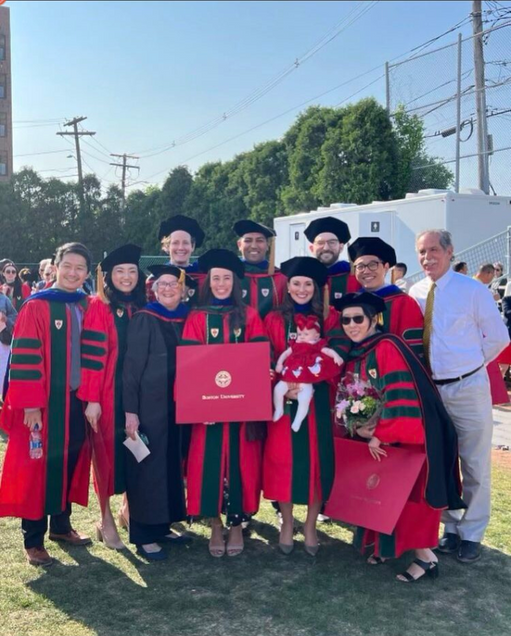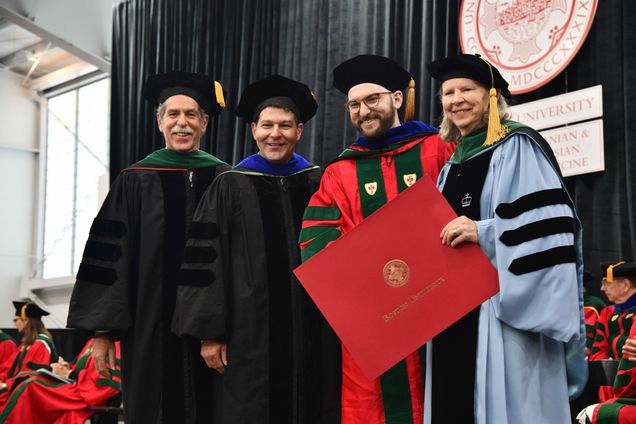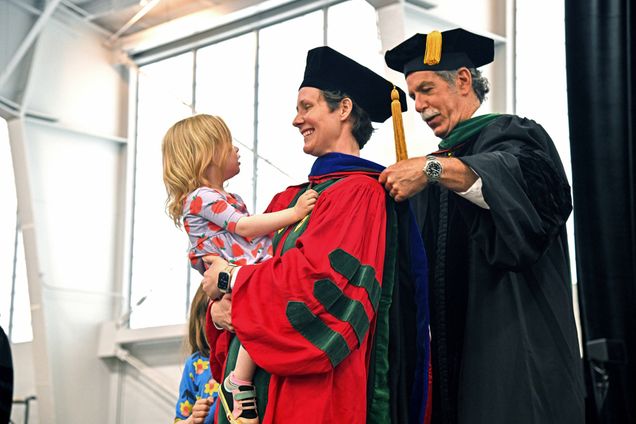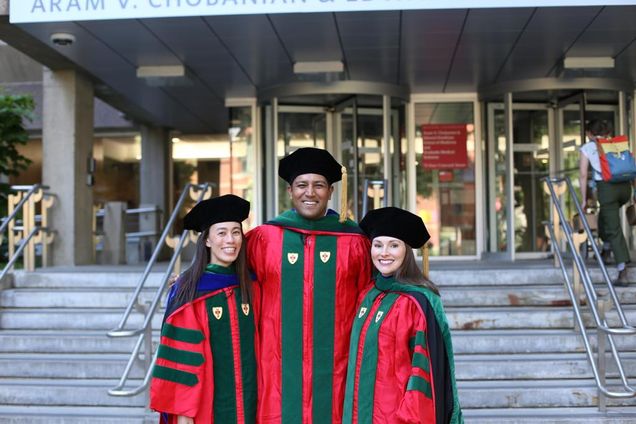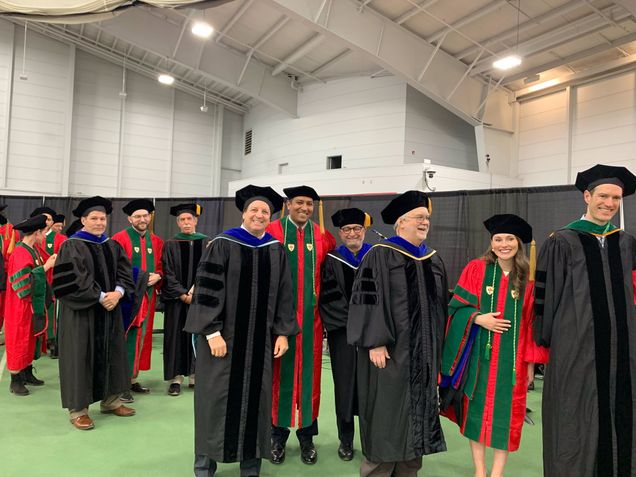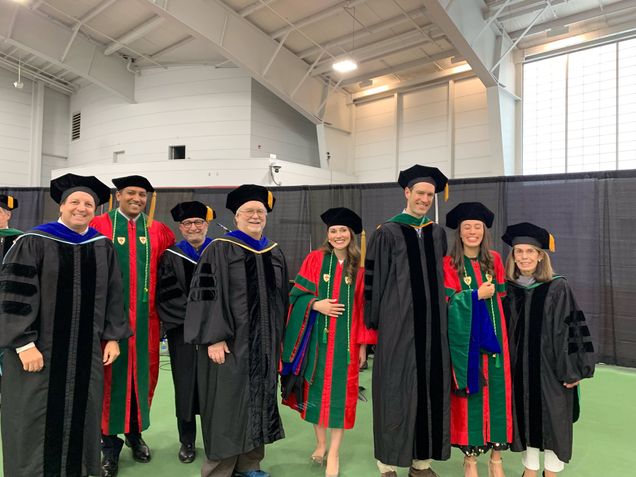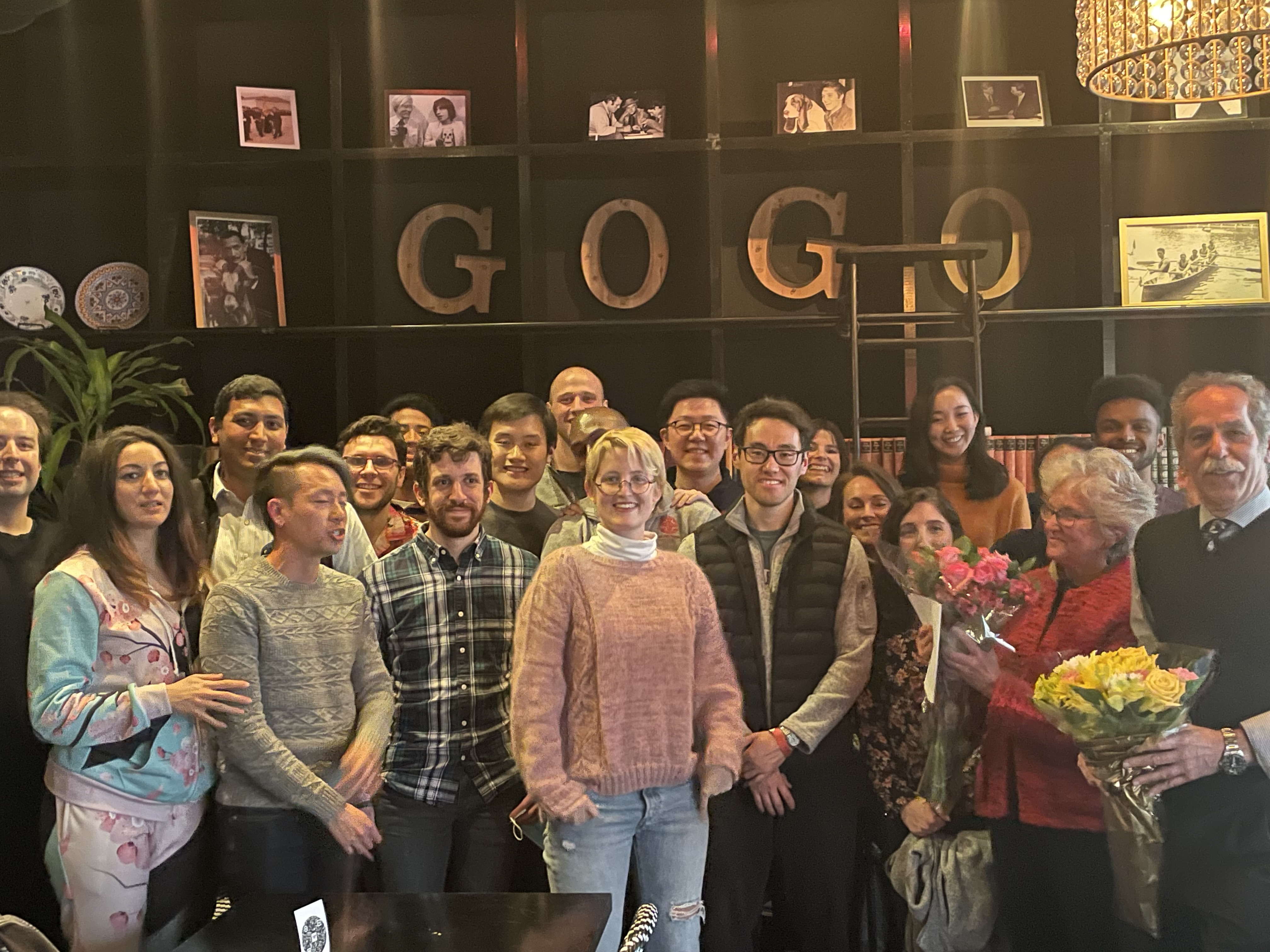News
Congratulations to Daniel Kirsch on a successful defense!
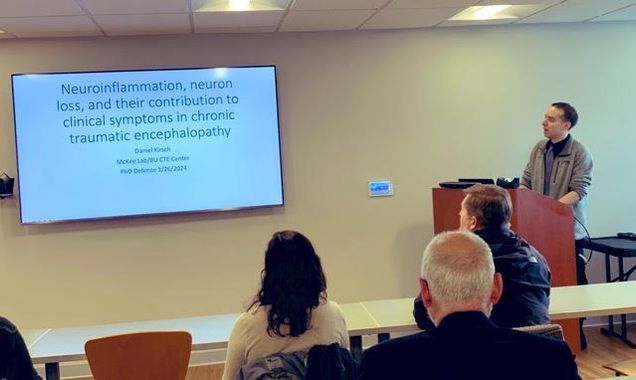
Congratulations to Daniel Kirsch on successfully defending his PhD dissertation on the pathological contributions to clinical symptoms of CTE!
MD PhD Students Shine at Medical Student Research Symposium!
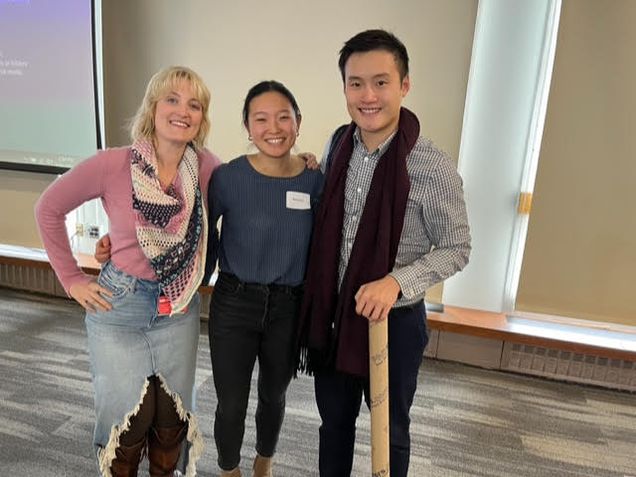
MD PhD students presented this past Monday at the Medical Student Research Symposium. Rose Zhao was selected as an oral presenter for her research on "Characterization of Whole-genome Double Sequencing Events Across Tissues in vivo." Martin Ma and Kristen Segars both won awards for their poster presentations. A huge congratulations to our students!
Alumni Spotlight Interview: Milissa Kaufman MD PhD
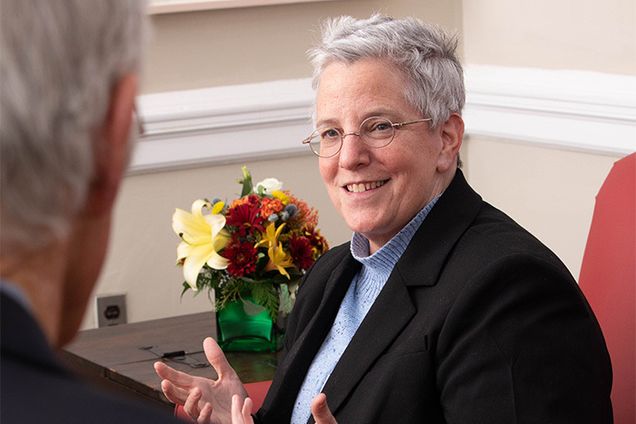
Dr. Milissa Kaufman is a graduate of the combined MD/PhD program at Boston University. Dr. Kaufman is the medical director at the Hill Center, a clinical program specializing in the treatment of trauma-related disorders.
SCB: Describe your journey to BUSM?
MK: Honestly, I thought entering BUSM from Arizona State as an undergraduate was an unachievable dream. I nearly flunked out of high school. Then I went to a community college, where I struggled with undiagnosed learning disabilities. I was not someone who was prime for academia or medical school…but I had this burning interest from an early age to understand people's minds… I started to read about psychiatry, and I knew that was what I wanted to do. But I wondered, “How am I ever getting into medical school?” I did not know any doctors. I had to take fewer classes at a time than most students because it was harder for me to study. But I worked very hard, switched my degree from a BA to BS ( I could not learn a foreign language), and entered the Honors college. There, I had to write a thesis. A friend suggested his mentor, a Reproductive Biologist as my PI, so I worked in her lab and even stayed there for a few years after college. The lab became family to me. I loved the environment…that we were all working together, focused on a Quest. We published my thesis, which was a gigantic thrill to me. It was then I finally realized I maybe could become a doctor. But I did not go to medical school for 3 years. I was nervous to take the MCAT, but my PI continuously encouraged me. My first score was not great, and I did not get accepted. So, I took an MCAT course and increased my score just enough. I had not yet said my dream aloud to anybody…I wanted to study psychological trauma and dissociation and become a psychiatrist. Without thinking I had much of a chance, I decided to pay the $75 fee and apply to BU. Boston was where many of the trauma researchers whose work I had read worked. The day I day I got accepted to BU was one I will never forget! Such a thrill! I entered the MD program and was asked to join the MD/PhD program my second year. I struggled with anatomy…the Dean met with me and casually said, “Oh, this happens every year”…So, they sent me for testing, and this confirmed that I had a learning disability. Now I finally understood why school has always been so challenging! One part of my disability is “visual spatial,” which explained why I could not do gross anatomy. But this realization changed my life.
SCB: After medical school, how did you transition to your PhD years?
MK: I ended up doing behavioral neuroscience for my PhD studies. I was truly fortunate to be accepted at the National Center for PTSD to do my dissertation research, located the Boston VA Hospital, headed by Terry Keane. Dr. Keane is an expert is psychological trauma and one of my heroes. I remember nervously walking into his office for the first time. I let him know I was interested in PTSD, and I had read all his work. I also told him that what I really want to study was trauma-related dissociation. He told me: “Do you really want to study dissociation and ruin your career?” However, he almost immediately told me he would support my goal, “as long as you do good science, the field needs it!” Dr. Keane was so wonderful. I was his first MD/PhD student, and he was excited about that, too. I spent five and a half years in graduate school working with pioneers in the trauma field. They threw me right into ongoing clinical studies and I learned about psychiatric diagnostic assessment, interviewing, and psychometrics. This experience set me up for success in a later psychiatry residency. The most important part of my training at VA was working with combat veterans who had PTSD. From them, I learned how to identify traumatic dissociation. Some vets were “doubly traumatized” with childhood abuse and combat-related PTSD. Many of them were dissociative and that was what I wanted to understand. As an aside, but an important part of my story: A bonus part of my training was that the atmosphere at the VA was very accepting. I came out in graduate school. I came out as gay. It seemed like it was an okay thing to do…That was a gift that I did not expect, to be okay in my skin for the first time.
SCB: How did you find your psychiatry residency…and how did they find you?
MK: The MGH/McLean Psychiatry Training Program was another career dream! It was a terrific training environment. The faculty is devoted to supporting residents. Plus, McLean Hospital was only one of maybe 2 or 3 units in the country that had specialty programs for women with PTSD and dissociative identity disorder (DID). My passion really was to study and treat the dissociative subtype of PTSD and DID, and at MGH/McLean, I found like-minded people. It was a long journey from being a college kid in Phoenix, Arizona who could barely get through high school to MGH/McLean! During residency, I worked with trauma experts including Dr. Sherry Winternitz, who ran the clinical trauma programs. She was highly supportive when I told her I wanted do a neuroimaging study to understand the brain basis of traumatic dissociation in DID. Despite there only being one project on dissociation ever supported by NIH, she was determined to help me. Dr. Winternitz facilitated seed funding for my lab through a significant philanthropic donation. This donation was from a family who care deeply about child abuse survivors.
SCB: What jump started your independent research into trauma and dissociation?
MK: It seemed like synchronicity! Following residency training, I became the medical director of a treatment program for women with PTSD and DID. There, I began recruiting patients for our first study exploring the brain basis of traumatic dissociation. Then, as luck would have it, soon after, trauma expert Kerry Ressler, MD/PhD came to McLean and became the chief scientific officer. He arrived with a generous spirit, and he paid for my brilliant Post-Doc, Lauren Lebois, PhD. My little lab - which at the time was doing only a single neuroimaging study – suddenly grew. I had my ideas about the brain basis of dissociation and, thankfully, Dr. Lebois could really write! Within months, she received an F32 training grant. We then started working with an NIH program officer who was open to studying dissociation in traumatized individuals…soon after we got an R21. This was the project that I have been fantasizing since I was in college --- identifying biomarkers for traumatic dissociation. We began publishing our findings and then received RO1 funding. Many had said to me, “You'll never get NIH funding to study traumatic dissociation.” But it was my passion, and I also had so many mentors along the way who were saying, “Do what you want to do!” That is my story. I now have a research program. The dual degree program at BU started this whole career for me. BU believed in me. It really has been a dream come true.
SCB: How did BUSM help your career goals?
MK: I had wonderful experiences everywhere I trained. But there was something special about BU and the Mission. BUSM draws a particular type of person, and the faculty at BU always had this passion, this Mission to serve. Important to me, they were not driven by ego but by the Mission itself. BU felt like home to me…there were always ups and downs, yet the faculty made it seem like it was okay. It was okay to be a little different and to go your own way. Some of my colleagues who also had challenges along the way turned out to be some of the most accomplished students. The faculty were so proud of them! BU training emphasizes doing things...it is a “doer’s program.” And many of my colleagues had dreams like me and went on to do exactly what they had dreamed possible. I am so glad to be able to finally say, “Thank you. BU.” Being at BU changed my life in in so many ways…it changes who you are as a person.
11/24/2023
Interviewer: Dr. S. Borkan
Nobel Prize for Medicine Goes to BU MD PhD Alum!
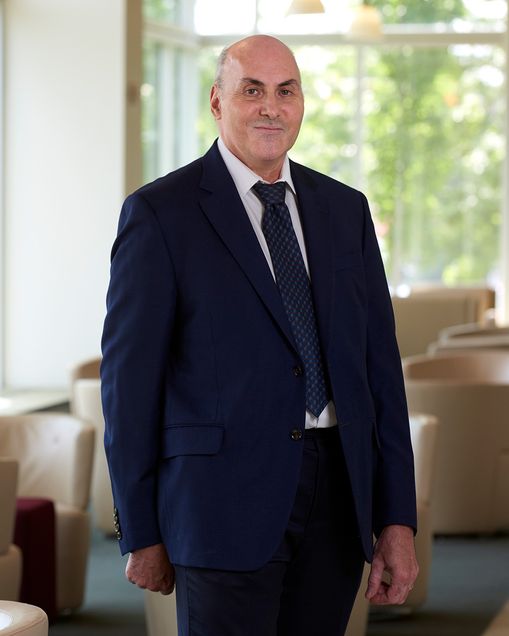
We congratulate Drew Weisman MD/PhD (class of 1987) in receiving the Nobel Prize in Physiology or Medicine! The Nobel Prize in Physiology or Medicine was awarded to Drew Weissman and Katalin Karikó for their breakthrough discoveries in mRNA technology that led to COVID vaccines.
Photo by Peggy Peterson/Courtesy of Penn Medicine.
Congratulations to Shen Ning on her AOA Induction!
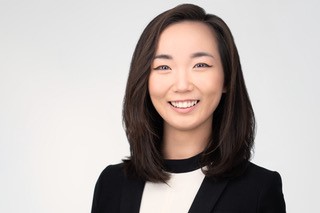
Shen Ning has been elected to have membership to the medical honor society, Alpha Omega Alpha (AOA). Induction into AOA is awarded to medical students who exemplify scholarship, character and have contributed significantly to the medical sciences and practice. On behalf of Boston University Chobanian & Avedisian School of Medicine's MD/PhD program, we would like to extend our warmest congratulations to Shen!
Shen now joins the ranks of the following MD/PhD students:
2022:Aditya Mithal, Kristy Abo, Katelyn Trecartin
2020: Ryan Quinton
2019: Marek Kowalski, Chris Gromisch and Iris Trutzer
2018: Anjali Jacobs
Congrats to our 2023 graduates!
Congratulations to our 2023 MD/PhD graduates Kristy Abo, Katelyn Batterman, Alissa Frame, Xu Ke, Yoonjoo Lee, Will Li, Jane Lock, Aditya Mithal, and Marc Vittoria! We wish you the best in your upcoming endeavors!
Read the Fall 2022 Bench to Bedpost Bulletin Here!
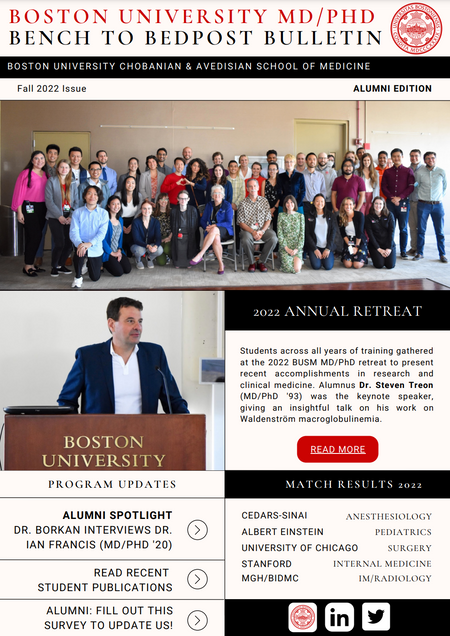 The Fall 2022 edition of the Boston University MD/PhD Bench to Bedpost Bulletin is now live! Some highlights from this semester's Alumni edition include:
The Fall 2022 edition of the Boston University MD/PhD Bench to Bedpost Bulletin is now live! Some highlights from this semester's Alumni edition include:
- Dr. Borkan's interview with Dr. Ian Francis (MD/PhD '20)
- A recap of the 2022 annual MD/PhD Retreat
- Two award-winning MD/PhD students
- And more!
The Bench to Bedpost Bulletin is brought to you by Aria Pearlman Morales, Morgan Corniquel and Katie Hohl, all chairs of the Alumni Committee Branch of the MD/PhD Student Government.
Conor Shea wins Moorman-Simon Fellowship
Congratulations to Conor for winning the 2022-2023 Moorman-Simon Fellowship! The fellowship is provided to current MD/PhD and PhD students in Computational Biomedicine who are working in the field of cancer research. Conor has been working in Beane and Spira-Lenburg Labs, using single cell RNA transcriptomics to profile premalignant lesions in the lungs and identify their progression to cancer.
Learn more about the fellowship here.
New paper from David Swain: Investigating the morphological changes induced by glaucoma
Congratulations to David Swain for his new paper studying endothelial glycocalyx morphology in primate eyes with induced glaucoma published in Cells this month! The work provides another puzzle piece in our ongoing investigation into the pathophysiology of glaucoma, mainly the effects of decreased outflow on the trabecular outflow pathway. Read more about his work here.
Congratulations to Martin Ma for winning a poster prize at the FASEB Lung meeting
Congratulations to Martin Ma from Darrell Kotton's lab for winning a poster prize at the FASEB Lung meeting! Martin’s poster was about using iPSC derived epithelial cells for airway regeneration.
Here is a picture of Martin at the poster presentation with his PI and fellow MDPhD classmate Carly Merritt!
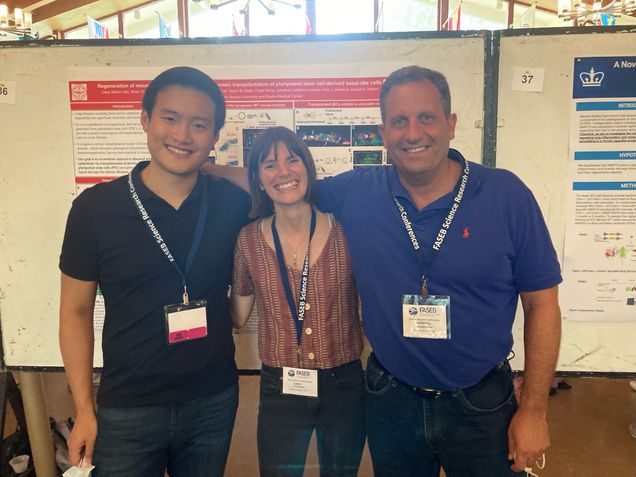
Dr. Borkan wins 2022 BU Ignition Award
Congratulations to Dr. Steven Borkan, program Co-Director, who was recently awarded a 2022 Boston University Ignition Award for his work investigating novel inhibitors of apoptosis in the setting of acute kidney injury (AKI). Read more about it at BU's The Brink newsletter.
Congratulations to our rising M3s on defending!
We are so proud of our students who are beginning their transition back into their clinical training. Below are our students and the titles of their thesis.
- Shen Ning (GPN, PI: Shelley Russek)- “Developing Targeted Magnetic Nanoparticles for Therapeutic Antibody Delivery in Alzheimer’s Disease”

- Margaret Minnig (GPN, PI: Valentina Sabino)- “The Role of Corticostriatal Pituitary Adenylate Cyclase Activating Polypeptide (PACAP) in Excessive Alcohol Drinking”
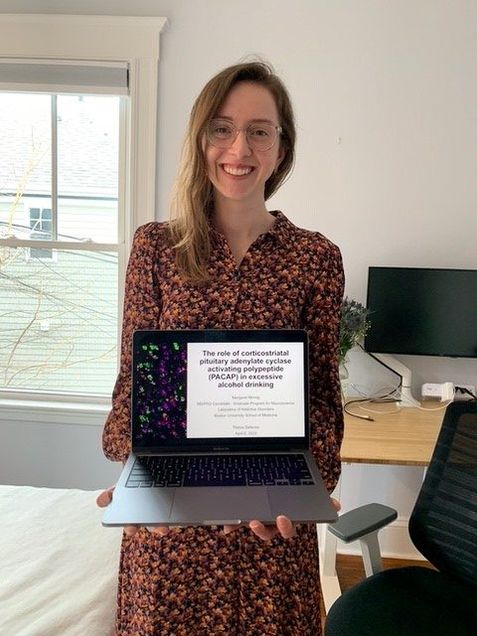
- Anthony Yeung (MTM, PI: George Murphy)- “Hematopoiesis in the Lung: From Development to Adulthood”
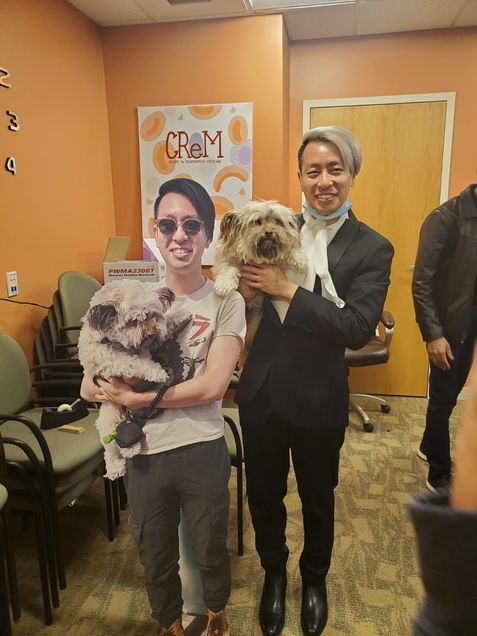
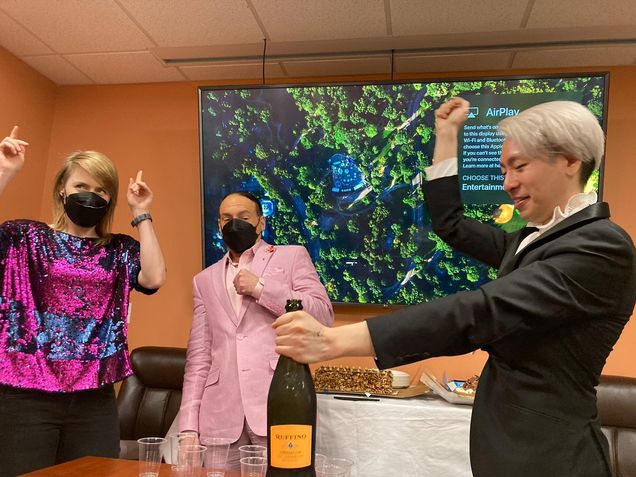
Congrats to our 2022 graduates!
Congratulations to our 2022 MD/PhD graduates Batbold Boldbaatar, Eric Brownhill, Chinaemere (Chino) Igwebuike, Ryan Quinton, and Yuliang (Leon) Sun! We wish you the best in your upcoming endeavors!
MD/PhD graduation/defense celebration
Thank you everyone for coming to our MDPhD graduation and defense celebration! It was great to see everyone together and we wish you the best in your transition to M3/residency!
Grand Rounds – Dr. David Holtzman
This month's Grand Rounds featured Dr. David Holtzman, Barbara Burton and Reuben M. Morriss III Distinguished Professor of Neurology at Washington University in St. Louis. For the past 27 years, professor Holtzman has been leading research into understanding Alzheimer's disease pathology and potential treatment options. Professor Holtzman has recently been investigating the role of sleep-wake cycle on amyloid-beta accumulation and subsequent Alzheimer's disease progression. While discussing the very interesting research topic, Dr. Holtzman provided examples in which insights in pathology learned through basic science research can be applied to potential clinical therapy developments. We are thankful to Dr. Holtzman for showing a potential pathway for physician-scientists who wish to combine basic science and clinical translation.
Grand Rounds – Dr. George Murphy
This month's Grand Rounds was led by Dr. George Murphy, an associate professor and co-director of Center for Regenerative Medicine (CReM) at BUSM. As one of the leading researchers at CReM, professor Murphy has been developing stem cell based platforms to study various hematopoietic diseases and potential clinical treatments. In this Grand Rounds talk, professor Murphy shared many insights on the clinical need for stem cell based sickle cell therapies and the current state of the field. Besides the scientific knowledge, professor Murphy also shared his views on the role of medical ethics in upcoming genetic modification therapies and the unique role physician-scientists will play in development of these therapies. We are thankful to have Dr. Murphy for our Grand Rounds this month and we hope to invite him for further discussion when opportunity arises.
Please click here to learn more about his lab and its recent achievements.
Career Development Event – Step 1
Thank you very much to the M1/M2s as well as the upper years for coming to this career development event (CDE) for Step 1 preparation. We appreciate the upperclassmen who have come today to share their insights in studying for Step 1, including useful resources and common pitfalls. We wish the best for the M1/M2s who hopefully found today's talk helpful for planning their study strategies.
Grand Rounds – Laura Lewis
For this month's Grand Rounds we have Dr. Laura Lewis, an assistant professor of Biomedical Engineering at Boston University. She has made recent headlines in neuroscience research community by imaging the cerebrospinal fluid washing in and out of the brain during deep sleep. Today, professor Lewis provided more insights on the collaboration that took place between her lab and the clinicians that lead to many meaningful research findings. Thank you Dr. Lewis for coming to our Grand Rounds and sharing your experiences.
APSA NE Physician Scientist Regional Meeting
This year, we will be hosting the Northeast Physician Scientist Student Symposium. This is a multi-institutional effort co-organized by BU, Tufts, Harvard/MIT, and UMass, to bring together students, trainees and faculty from the Northeast region medical schools to discuss career development and science as physician scientists. This event is a great opportunity to network and meet other MD/PhD’s in the area!
For more info, including registration and abstract submission links, head here.
We are very excited to welcome 6 new entering M1s to BUSM and to our program!
Sam Calderazzo (Boston University)
Kenny Kim (Wash U)
Minyi Lee (MIT)
Carly Merritt (Colorado College)
Linzheng Shi (Vanderbilt)
Benjamin Snyder (UC Berkeley)
